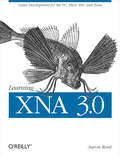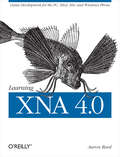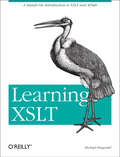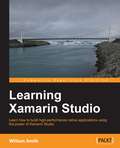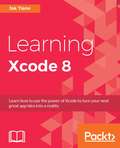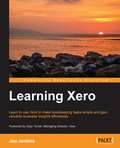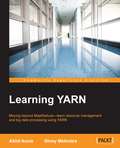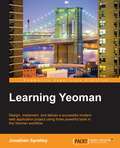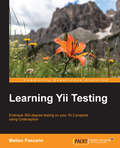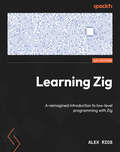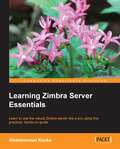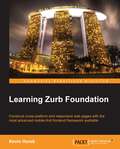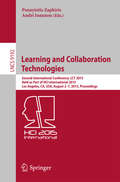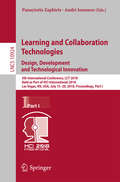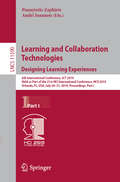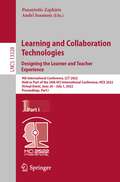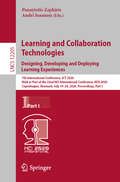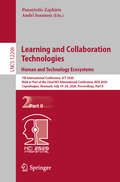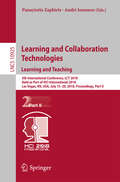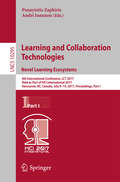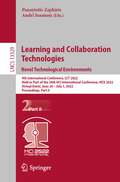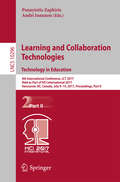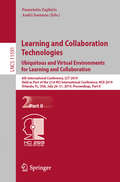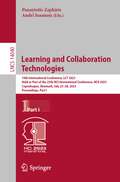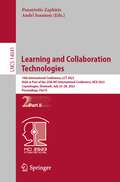- Table View
- List View
Learning XNA 3.0: XNA 3.0 Game Development for the PC, Xbox 360, and Zune
by Aaron ReedDo you have what it takes to become a game developer? With this hands-on book, you'll learn quickly and easily how to develop computer games with Microsoft's XNA 3.0 framework-not just for your PC, but for Xbox 360 and the Microsoft Zune as well. Written by an experienced university-level game development instructor, Learning XNA 3.0 walks you through the framework in a clear and understandable step-by-step format. Each chapter offers a self-contained lesson with lots of illustrations and annotated examples to help you master key concepts. Once you finish the book, you'll know how to develop sophisticated games from start to finish.Learn game development concepts from 2D animation to 3D cameras and effectsDelve into high-level shader language (HLSL) and introductory artificial intelligence conceptsDevelop three complete and exciting games using 2D,3D and multiplayer conceptsDevelop and deploy games to the Xbox 360 and the Microsoft ZuneWhile teaching XNA to beginning game developers, author Aaron Reed noticed that several key concepts were difficult for students to grasp. Learning XNA 3.0 was written specifically to address those issues. With this book, you can test your understanding and practice new skills as you go with unique "Test Your Knowledge" exercises and review questions in each chapter. Why wait? Amaze your family and friends by building your own games for the PC, Xbox 360, and Zune-with Learning XNA 3.0."An outstanding book! Teaches you XNA development in a smart way, starting from 2D basics and going into 3D and shader development. What I really like is the 'peeling the onion' approach the author takes, which builds up knowledge from previous chapters."--David "LetsKillDave" Weller, CEO, Cogito Ergonomics, LLC, and former XNA program manager
Learning XNA 4.0: Game Development for the PC, Xbox 360, and Windows Phone 7
by Aaron ReedWant to develop games for Xbox 360 and Windows Phone 7? This hands-on book will get you started with Microsoft's XNA 4.0 development framework right away -- even if you have no experience developing games. Although XNA includes several key concepts that can be difficult for beginning web developers to grasp, Learning XNA 4.0 shortens the learning curve by walking you through the framework in a clear and understandable step-by-step format.Each chapter offers a self-contained lesson with illustrations and annotated examples, along with exercises and review questions to help you test your understanding and practice new skills as you go. Once you've finished this book, you'll know how to develop your own sophisticated games from start to finish.Learn game development from 2D animation to 3D cameras and effectsDelve into high-level shader language (HLSL) and introductory artificial intelligence conceptsBuild three complete, exciting games using 2D, 3D, and multiplayer techniquesDevelop for and deploy your games to the Xbox 360 and Windows Phone 7
Learning XSLT: A Hands-On Introduction to XSLT and XPath
by Michael FitzgeraldXSLT is a powerful language for transforming XML documents into something else. That something else can be an HTML document, another XML document, a Portable Document Format (PDF) file, a Scalable Vector Graphics (SVG) file, a Virtual Reality Modeling Language (VRML) file, Java code, or a number of other things. You write an XSLT stylesheet to define the rules for transforming an XML document, and the XSLT processor does the work.As useful as XSLT is, its peculiar characteristics make it a difficult language in which to get started. In fact, newcomers are often a little dazed on first contact. Learning XSLT offers a hands-on introduction to help them get up to speed with XSLT quickly. The book will help web developers and designers understand this powerful but often mystifying template-driven and functional-styled language, getting them over the many differences between XSLT and the more conventional programming languages.Learning XSLT moves smoothly from the simple to complex, illustrating all aspects of XSLT 1.0 through step-by-step examples that you'll practice as you work through the book. Thorough in its coverage of the language, the book makes few assumptions about what you may already know. You'll learn about XSLT's template-based syntax, how XSLT templates work with each other, and gain an understanding of XSLT variables. Learning XSLT also explains how the XML Path Language (XPath) is used by XSLT and provides a glimpse of what the future holds for XSLT 2.0 and XPath 2.0.The ability to transform one XML vocabulary to another is fundamental to exploiting the power of XML. Learning XSLT is a carefully paced, example-rich introduction to XSLT that will have you understanding and using XSLT on your own in no time.
Learning Xamarin Studio
by William SmithThis book is intended for .NET developers with any level of experience and who are interested in building native applications without the hassle of becoming Objective-C or Java experts. Although it will be beneficial to have some development experience, particularly in .NET, Learning Xamarin help even a novice developer get past the headaches of setting up and customizing their new development environment so they can move on to producing high-quality native applications quickly.
Learning Xcode 8
by Jak TianoLearn how to use the power of Xcode to turn your next great app idea into a reality About This Book * Learn the theory and tools behind app development using Swift 3 and Xcode 8 * Build a fully featured iOS app, including a companion app for the Apple Watch * Optimize, debug, and ultimately release your app on Test Flight and the App Store Who This Book Is For This book is intended for programmers looking to get a jump-start into the world of iOS development. Whether you're a young student who has only spent a few months with Java, or a seasoned developer who has spent their career developing for a different platform, all that is expected is a basic understanding of a programming language such as C++, C#, or Java. What You Will Learn * Understand the most important features of the Xcode IDE * Write Swift 3 code for application data models and view controllers * Prepare visual layouts for an iOS application using storyboards, size classes, and auto-layout * Integrate many common technologies into an app, such as multi-touch gestures, CoreData, and notifications * Build companion applications for the Apple Watch with watchOS 3 * Debug applications using Xcode's suite of debugging tools, and prevent bugs with unit testing * Optimize an application using Xcode 8's profiling tools and asset catalogs * Distribute a beta application through TestFlight, and a finished application through the App Store In Detail Over the last few years, we've seen a breakthrough in mobile computing and the birth of world-changing mobile apps. With a reputation as one of the most user-centric and developer-friendly platforms, iOS is the best place to launch your next great app idea. As the official tool to create iOS applications, Xcode is chock full of features aimed at making a developer's job easier, faster, and more fun. This book will take you from complete novice to a published app developer, and covers every step in between. You'll learn the basics of iOS application development by taking a guided tour through the Xcode software and Swift programming language, before putting that knowledge to use by building your first app called "Snippets." Over the course of the book, you will continue to explore the many facets of iOS development in Xcode by adding new features to your app, integrating gestures and sensors, and even creating an Apple Watch companion app. You'll also learn how to use the debugging tools, write unit tests, and optimize and distribute your app. By the time you make it to the end of this book, you will have successfully built and published your first iOS application. Style and approach This easy-to-follow guide presents topics in a hands-on lecture format where concepts are introduced and explained, then used in an example as reinforcement. The first third of the book covers the separate building blocks of development, while the second two thirds cover the development of an app from start to finish.
Learning Xero
by Jon JenkinsLearn to use Xero to make bookkeeping tasks simple and gain valuable business insights effortlessly About This Book * Explore the process of setting up and using Xero * Concise step-by-step instructions to teach you best practice bookkeeping * Discover performance enhancing add-ons to reduce your daily work Who This Book Is For Intended for those who want to learn how to use Xero to get better insights from their business data and learn the best practices of bookkeeping using Xero. Perhaps you have never used Xero, or perhaps you want to migrate from an existing accounting application to Xero. In either case, this book will get you up and running quickly. It would be useful to have a bit of familiarity with basic bookkeeping concepts, but no prior experience of Xero is required. What You Will Learn * Configure Xero from scratch and fine-tune it ready for use * Set up bank feeds and automate the bank reconciliation process * Create workflows and segregation of duties for sales and purchases * Run payrolls, giving employees the ability to request time off and generate their own payslips * Produce reports to gain a better understanding of your business data and make better quality decisions * Import and export data ready for analysis * Use the power of a mobile device to run your business from the palm of your hand * Manage your inventory with fully automated transaction processing In Detail The book begins by tackling the initial set up of Xero to ensure optimum configuration for success. From there, the next logical step is to set up the automated bank feeds, which is the best innovation in bookkeeping in years. Now that your bank data is ready for importing, we will tackle the most common transactional items, being sales invoices and purchase bills. Despite these being largely transactional, we will work through ways to automate the process where possible, save time, and avoid potential human errors along the way. Then we will start checking reports and analyze what is working or not and make changes to workflows and setups. The end result is that you will have a fully configured system ready to use and years of experience offering best practice solutions to what have been, for years, unnecessary roadblocks in your business. Style and approach This book contains easy-to-follow, step-by-step examples, explaining from start to finish how to set up and use Xero while implementing best practices of bookkeeping.
Learning YARN
by Akhil Arora Shrey MehrotraThis book is intended for those who want to understand what YARN is and how to efficiently used it for resource management of large clusters. For cluster administrators, this book gives a detailed explanation of provisioning and managing YARN clusters. If you are an or a Java developer or an open-source contributor, this book will help you to drill down the YARN architecture and application execution phases. This book would also help big data engineers explore YARN integration with real-time analytics technologies like Spark and Storm.
Learning Yeoman
by Jonathan SpratleyIf you are a web developer with some experience in JavaScript and want to enter the world of modern web applications, then this book is ideal for you. Learning how to leverage the three tools (Yo, Bower, and Grunt) in the Yeoman workflow will be perfect as your next step towards building scalable, dynamic, and modern web applications for just about any platform.
Learning Yii Testing
by Matteo PescarinDevelopers who have a solid pre-existing knowledge of Yii's core concepts will find this book an ideal introduction to learning to write tests using Yii 2's tools. You'll learn to create faster and more reliable applications with less time and effort.
Learning Zig: A reimagined introduction to low-level programming with Zig
by Alex RiosMaster Zig's blend of safety and performance by building real-world systems applications, and learn memory management through to compile-time execution to create reliable software with full control and zero hidden behaviorsKey FeaturesWrite high-performance code with Zig's clear, no-surprises approach to control flowDiscover memory management techniques to get complete control without sacrificing safety or introducing complexityBuild portable apps with Zig's powerful build system and seamless C interoperability for real-world problem-solvingPurchase of the print or Kindle book includes a free PDF eBookBook DescriptionSystem programming has long forced developers to choose between safety and performance, but Zig changes the game with its no hidden control flow philosophy and explicit resource management. If you've struggled with memory leaks, undefined behavior, or cryptic compiler errors, Zig offers an alternative that puts you back in control. Alex Rios, a seasoned software engineer with experience building high-throughput systems across fintech, telecom, and gaming industries, brings his unconventional system design approach and offers insight into Zig, as someone who's seen the limitations of existing languages firsthand. You’ll get to grips with Zig's safety-centric design fundamentals, which will guide you through setting up your app development environment and writing your first programs. You'll then explore Zig's distinctive features in depth, such as explicit error handling, manual memory management, and compile-time execution. The book tackles each topic with a blend of technical depth and wit, ensuring you grasp not just the how but also the why behind Zig's design decisions. By the end of this book, you'll be ready to build a complete application that interacts with the OS, third-party libraries, and C dependencies, as well as engage with Zig's growing community and contribute to its ecosystem.What you will learnFind out how to maintain low-level control over system resourcesSet up a Zig development environment across different operating systemsOrganize maintainable projects with proper structure and build systemsImplement error handling using Zig's unique approach to managing failuresLeverage Zig's standard library effectively for everyday programming tasksBuild applications that use files, external libraries, and C codeCross-compile and package Zig applications for multiple platformsWho this book is forThis book is for developers looking to master efficient and safe programming with Zig. The target audience includes system programmers exploring manual memory management and safety features, embedded systems developers building high-performance software, WebAssembly enthusiasts creating web applications, programmers transitioning from Go or JavaScript for better control over memory and performance, and C/C++ developers seeking simplicity and low-level control without sacrificing safety or performance.
Learning Zimbra Server Essentials
by Abdelmonam KoukaA standard tutorial approach which will guide the readers on all of the intricacies of the Zimbra Server.If you are any kind of Zimbra user, this book will be useful for you, from newbies to experts who would like to learn how to setup a Zimbra server. If you are an IT administrator or consultant who is exploring the idea of adopting, or have already adopted Zimbra as your mail server, then this book is for you. No prior knowledge of Zimbra is required.
Learning Zurb Foundation
by Kevin HorekIf you are a web designer, developer, or anyone who is interested in building responsive websites, then this book is a must-have. Basic knowledge of CSS, HTML, and JavaScript is required.
Learning and Collaboration Technologies
by Panayiotis Zaphiris Andri IoannouThe LNCS volume 9192 constitutes the refereed proceedings of the Second International Conference on Learning and Collaboration Technologies, LCT 2015, held as part of the 17th International Conference on Human-Computer Interaction, HCII 2015, in Los Angeles, CA, USA in August 2015, jointly with 15 other thematically similar conferences. The total of 1462 papers and 246 posters presented at the HCII 2015 conferences were carefully reviewed and selected from 4843 submissions. These papers address addressing the following major topics: technology-enhanced learning, adaptive and personalised learning and assessment, virtual worlds and virtual agents for learning, collaboration and Learning Serious Games and ICT in education.
Learning and Collaboration Technologies. Design, Development and Technological Innovation: 5th International Conference, LCT 2018, Held as Part of HCI International 2018, Las Vegas, NV, USA, July 15-20, 2018, Proceedings, Part I (Lecture Notes in Computer Science #10924)
by Panayiotis Zaphiris Andri IoannouThis two-volume set LNCS 10924 and 10925 constitute the refereed proceedings of the 5th International Conference on Learning and Collaboration Technologies, LCT 2018, held as part of the 20th International Conference on Human-Computer Interaction, HCII 2018, in Las Vegas, NV, USA in July 2018. The 1171 papers presented at HCII 2018 conferences were carefully reviewed and selected from 4346 submissions. The papers cover the entire field of human-computer interaction, addressing major advances in knowledge and effective use of computers in a variety of applications areas. The papers in this volume are organized in the following topical sections: designing and evaluating systems and applications, technological innovation in education, learning and collaboration, learners, engagement, motification, and skills, games and gamification of learning, technology-enhanced teaching and assessment, computing and engineering education.
Learning and Collaboration Technologies. Designing Learning Experiences: 6th International Conference, LCT 2019, Held as Part of the 21st HCI International Conference, HCII 2019, Orlando, FL, USA, July 26–31, 2019, Proceedings, Part I (Lecture Notes in Computer Science #11590)
by Panayiotis Zaphiris Andri IoannouThis two-volume set LNCS 11590 and 11591 constitutes the refereed proceedings of the 6th International Conference on Learning and Collaboration Technologies, LCT 2019, held as part of the 21st International Conference on Human-Computer Interaction, HCII 2019, in Orlando, FL, USA in July 2019. The 1274 full papers and 209 posters presented at the HCII 2019 conferences were carefully reviewed and selected from 5029 submissions. The papers cover the entire field of human-computer interaction, addressing major advances in knowledge and effective use of computers in a variety of applications areas. The papers in this volume are organized in the following topical sections: designing and evaluating learning experiences; theoretical and pedagogical approaches in technology-enhanced learning; cognitive and psychological issues in learning; and technology in STEM education.
Learning and Collaboration Technologies. Designing the Learner and Teacher Experience: 9th International Conference, LCT 2022, Held as Part of the 24th HCI International Conference, HCII 2022, Virtual Event, June 26 – July 1, 2022, Proceedings, Part I (Lecture Notes in Computer Science #13328)
by Panayiotis Zaphiris Andri IoannouThis proceedings, LCT 2022, constitutes the refereed proceedings of the 9th International Conference on Learning and Collaboration Technologies, LCT 2022, held as Part of the 24th International Conference, HCI International 2022, which took place in June/July 2022. Due to COVID-19 pandemic the conference was held virtually.The total of 1271 papers and 275 poster papers included in the 39 HCII 2022 proceedings volumes was carefully reviewed and selected from 5487 submissions. The papers of LCT 2022 are organized in topical sections named: Designing and Developing Learning Technologies; Learning and Teaching Online; Diversity in Learning; Technology in Education: Practices and Experiences.
Learning and Collaboration Technologies. Designing, Developing and Deploying Learning Experiences: 7th International Conference, LCT 2020, Held as Part of the 22nd HCI International Conference, HCII 2020, Copenhagen, Denmark, July 19–24, 2020, Proceedings, Part I (Lecture Notes in Computer Science #12205)
by Panayiotis Zaphiris Andri IoannouThis two-volume set LNCS 12205 and LNCS 12206 constitutes the proceedings of the 7th International Conference on Learning and Collaboration Technologies, LCT 2020, held as part of the 22nd International Conference, HCI International 2020, which took place in Copenhagen, Denmark, in July 2020.The total of 1439 papers and 238 posters included in the 37 HCII 2020 proceedings volumes was carefully reviewed and selected from 6326 submissions.The papers in this volume are organized in the following topical sections: designing and evaluating learning experiences; learning analytics, dashboards and learners models; language learning and teaching; and technology in education: policies and practice. As a result of the Danish Government's announcement, dated April 21, 2020, to ban all large events (above 500 participants) until September 1, 2020, the HCII 2020 conference was held virtually.
Learning and Collaboration Technologies. Human and Technology Ecosystems: 7th International Conference, LCT 2020, Held as Part of the 22nd HCI International Conference, HCII 2020, Copenhagen, Denmark, July 19–24, 2020, Proceedings, Part II (Lecture Notes in Computer Science #12206)
by Panayiotis Zaphiris Andri IoannouThis two-volume set LNCS 12205 and LNCS 12206 constitutes the proceedings of the 7th International Conference on Learning and Collaboration Technologies, LCT 2020, held as part of the 22nd International Conference, HCI International 2020, which took place in Copenhagen, Denmark, in July 2020.The total of 1439 papers and 238 posters included in the 37 HCII 2020 proceedings volumes was carefully reviewed and selected from 6326 submissions.The papers in this volume are organized in the following topical sections: communication and conversation in learning; cognition, emotions and learning; games and gamification in learning; VR, robot and IoT in learning; and collaboration technology and collaborative learning. As a result of the Danish Government's announcement, dated April 21, 2020, to ban all large events (above 500 participants) until September 1, 2020, the HCII 2020 conference was held virtually.
Learning and Collaboration Technologies. Learning and Teaching: 5th International Conference, LCT 2018, Held as Part of HCI International 2018, Las Vegas, NV, USA, July 15-20, 2018, Proceedings, Part II (Lecture Notes in Computer Science #10925)
by Panayiotis Zaphiris Andri IoannouThis two-volume set LNCS 10924 and 10925 constitute the refereed proceedings of the 5th International Conference on Learning and Collaboration Technologies, LCT 2018, held as part of the 20th International Conference on Human-Computer Interaction, HCII 2018, in Las Vegas, NV, USA in July 2018. The 1171 papers presented at HCII 2018 conferences were carefully reviewed and selected from 4346 submissions. The papers cover the entire field of human-computer interaction, addressing major advances in knowledge and effective use of computers in a variety of applications areas. The papers in this volume are organized in the following topical sections: designing and evaluating systems and applications, technological innovation in education, learning and collaboration, learners, engagement, motification, and skills, games and gamification of learning, technology-enhanced teaching and assessment, computing and engineering education.
Learning and Collaboration Technologies. Novel Learning Ecosystems
by Panayiotis Zaphiris Andri IoannouThe two-volume set LNCS 10295 and 10296 constitute the refereed proceedings of the 4th International Conference on Learning and Collaboration Technologies, LCT 2017, held as part of the 19th International Conference on Human-Computer Interaction, HCII 2017, in Vancouver, BC, Canada, in July 2017, in conjunction with 15 thematically similar conferences. The 1228 papers presented at the HCII 2017 conferences were carefully reviewed and selected from 4340 submissions.The papers cover the entire field of human-computer interaction, addressing major advances in knowledge and effective use of computers in a variety of application areas. The papers included in this volume are organized in the following topical sections: multimodal and natural interaction for learning; learning and teaching ecosystems; e-learning, social media and MOOCs; beyond the classroom; and games and gamification for learning.
Learning and Collaboration Technologies. Novel Technological Environments: 9th International Conference, LCT 2022, Held as Part of the 24th HCI International Conference, HCII 2022, Virtual Event, June 26 – July 1, 2022, Proceedings, Part II (Lecture Notes in Computer Science #13329)
by Panayiotis Zaphiris Andri IoannouChapter “Developing a VR Tool to Support Repeat Pattern Design Learning ” is available open access under a Creative Commons Attribution 4.0 International License via link.springer.com.
Learning and Collaboration Technologies. Technology in Education
by Panayiotis Zaphiris Andri IoannouThe two-volume set LNCS 10295 and 10296 constitute the refereed proceedings of the 4th International Conference on Learning and Collaboration Technologies, LCT 2017, held as part of the 19th International Conference on Human-Computer Interaction, HCII 2017, in Vancouver, BC, Canada, in July 2017, in conjunction with 15 thematically similar conferences. The 1228 papers presented at the HCII 2017 conferences were carefully reviewed and selected from 4340 submissions.The papers cover the entire field of human-computer interaction, addressing major advances in knowledge and effective use of computers in a variety of application areas. The papers included in this volume are organized in the following topical sections: STEM education; diversity in learning; learning analytics; and improving the learning and collaboration experience.The chapter 'The Quality of MOOCs: How to Improve the Design of Open Education and Online Courses for Learners?' is Open Access under a CC BY 4.0 license.
Learning and Collaboration Technologies. Ubiquitous and Virtual Environments for Learning and Collaboration: 6th International Conference, LCT 2019, Held as Part of the 21st HCI International Conference, HCII 2019, Orlando, FL, USA, July 26–31, 2019, Proceedings, Part II (Lecture Notes in Computer Science #11591)
by Panayiotis Zaphiris Andri IoannouThis two-volume set LNCS 11590 and 11591 constitutes the refereed proceedings of the 6th International Conference on Learning and Collaboration Technologies, LCT 2019, held as part of the 21st International Conference on Human-Computer Interaction, HCII 2019, in Orlando, FL, USA in July 2019. The 1274 full papers 209 posters presented at the HCII 2019 conferences were carefully reviewed and selected from 5029 submissions. The papers cover the entire field of human-computer interaction, addressing major advances in knowledge and effective use of computers in a variety of applications areas. The papers in this volume are organized in the following topical sections: mobile and ubiquitous learning; virtual reality and augmented reality systems for learning; and collaborative technology.
Learning and Collaboration Technologies: 10th International Conference, LCT 2023, Held as Part of the 25th HCI International Conference, HCII 2023, Copenhagen, Denmark, July 23–28, 2023, Proceedings, Part I (Lecture Notes in Computer Science #14040)
by Panayiotis Zaphiris Andri IoannouThis two-volume set of LCT 2023, constitutes the refereed proceedings of the 10th International Conference on Learning and Collaboration Technologies, LCT 2023, held as Part of the 24th International Conference, HCI International 2023, which took place in July 2023 in Copenhagen, Denmark.The total of 1578 papers and 396 posters included in the HCII 2023 proceedings volumes was carefully reviewed and selected from 7472 submissions. The papers of LCT 2022 Part I are organized in topical sections named: Designing Learning Experiences; Understanding the Learning Experience; Technology-supported Teaching; Supporting Creativity in Learning.
Learning and Collaboration Technologies: 10th International Conference, LCT 2023, Held as Part of the 25th HCI International Conference, HCII 2023, Copenhagen, Denmark, July 23–28, 2023, Proceedings, Part II (Lecture Notes in Computer Science #14041)
by Panayiotis Zaphiris Andri IoannouThis two-volume set of LCT 2023, constitutes the refereed proceedings of the 10th International Conference on Learning and Collaboration Technologies, LCT 2023, held as Part of the 24th International Conference, HCI International 2023, which took place in July 2023 in Copenhagen, Denmark. The total of 1578 papers and 396 posters included in the HCII 2023 proceedings volumes was carefully reviewed and selected from 7472 submissions. The papers of LCT 2022 Part II are organized in topical sections named: XR for Learning and Education; Learning with Robots; Virtual, Blended and Hybrid Learning.
